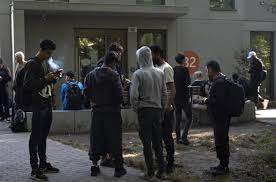BRUSSELS (AFP): The EU will seek Thursday to make progress on a troubled reform of its policy toward asylum-seekers and migrants, with many member states looking to coax Germany to agree key measures.
Paralysis on the issue has caused frustration in the 27-nation bloc as it faces a rise in irregular migration. The arrival of thousands of asylum-seekers on the Italian island of Lampedusa has spurred matters.
The aim of the reform, put on the table three years ago, is to have EU countries share the burden posed by the arrivals, either by taking in some of the migrants who mainly arrive in Italy or Greece or contributing money to those that do.
The text, drawn up by the European Commission, is in part a bid to forge Europe-wide solidarity in case of a repeat of the massive 2015-2016 influx of asylum-seekers, most of whom were Syrians fleeing their civil war.
Key proposals include lengthening the detention period of irregular migrants arriving on EU soil from 12 weeks to 20 weeks and accelerating evaluations of asylum applications.
In July, an attempt to get the reform adopted failed when the required weighted majority of EU countries was not met.
Hungary, Poland, Austria and the Czech Republic voted against the package, while Germany, Slovakia and the Netherlands abstained.
Germany — a heavyweight voting power — wanted carve-outs for minors and families.
Its foreign minister, Annalena Baerbock, on Sunday warned that the current proposal would “de facto prompt a large number of unregistered refugees to head toward Germany if there were a crisis”.
But German Interior Minister Nancy Faeser on Wednesday told Handelsblatt newspaper that Berlin was determined to “finalize” revised EU policy on migration.
Several EU countries have called for the file to be settled quickly.
“We have no time to lose,” Belgium’s minister for migration Nicole de Moor said during a conference Monday organized by the European Policy Center think tank. Failure to agree the pact “could threaten European unity”.
To put pressure, the European Parliament last week decided to pause its negotiations with EU member states on aspects of the pact, dealing with reinforced security along the bloc’s outer border.
One relates to Eurodac, a biometric database for asylum-seekers, and the introduction of a mandatory screening procedure of irregular arrivals.
The goal of the EU is to have the reform adopted before European elections next June that will usher in a new European Parliament and commission.
The next cycle in EU politics could see a political shift in the European Parliament, given the rise of rightwing parties in several EU countries, and would see Hungary and Poland — both hostile to hosting asylum-seekers — take turns holding the rotating EU presidency that sets policy agendas.







